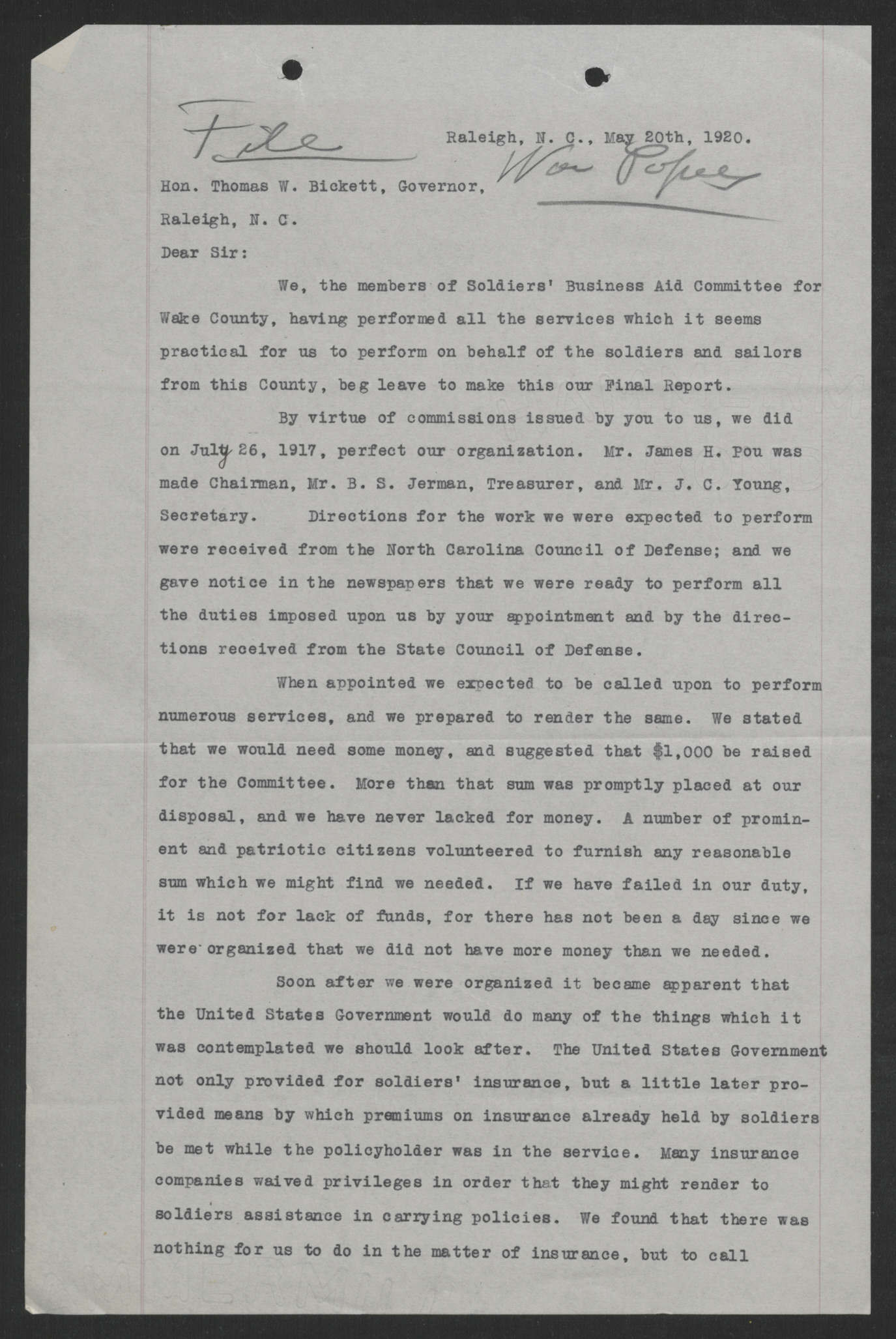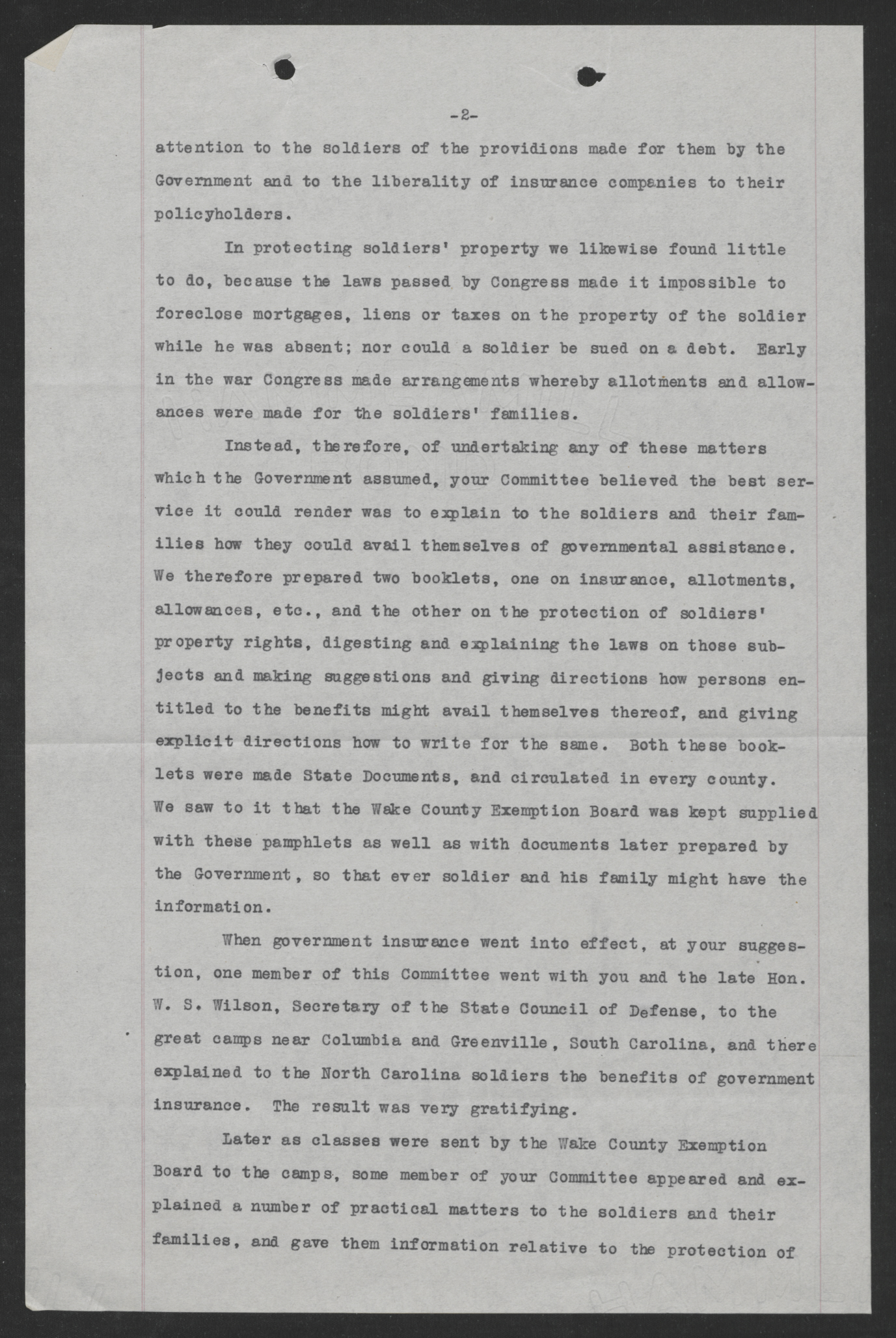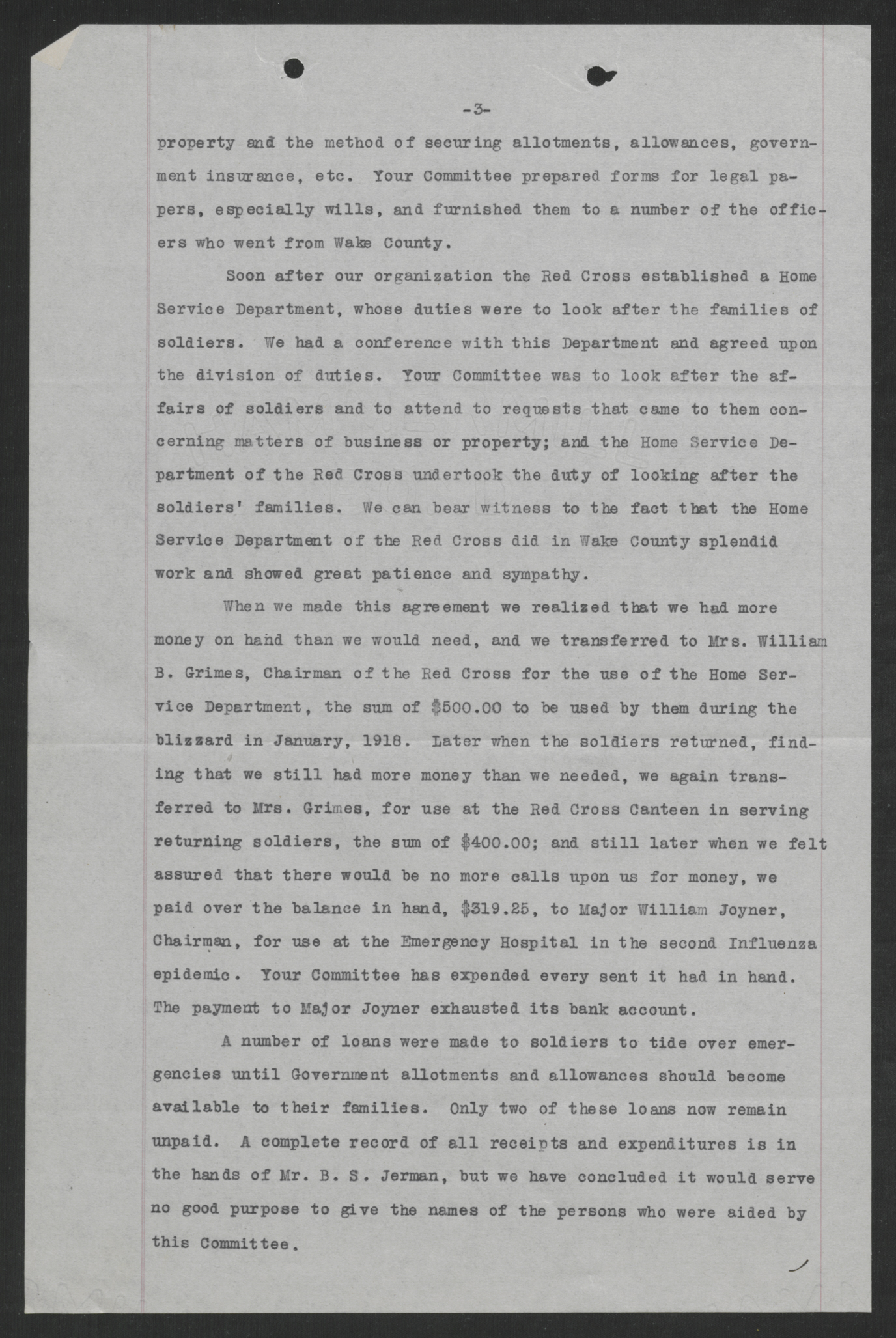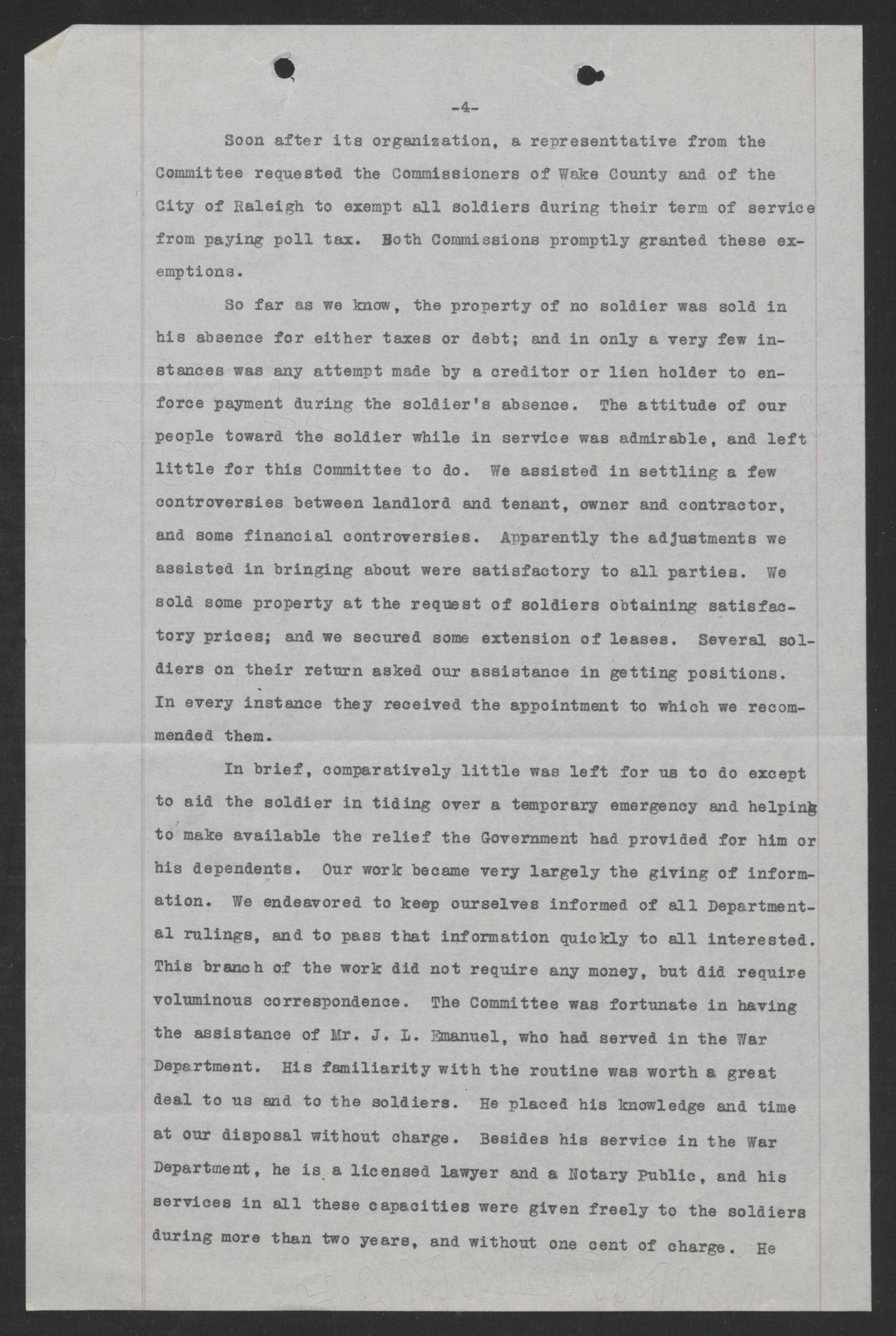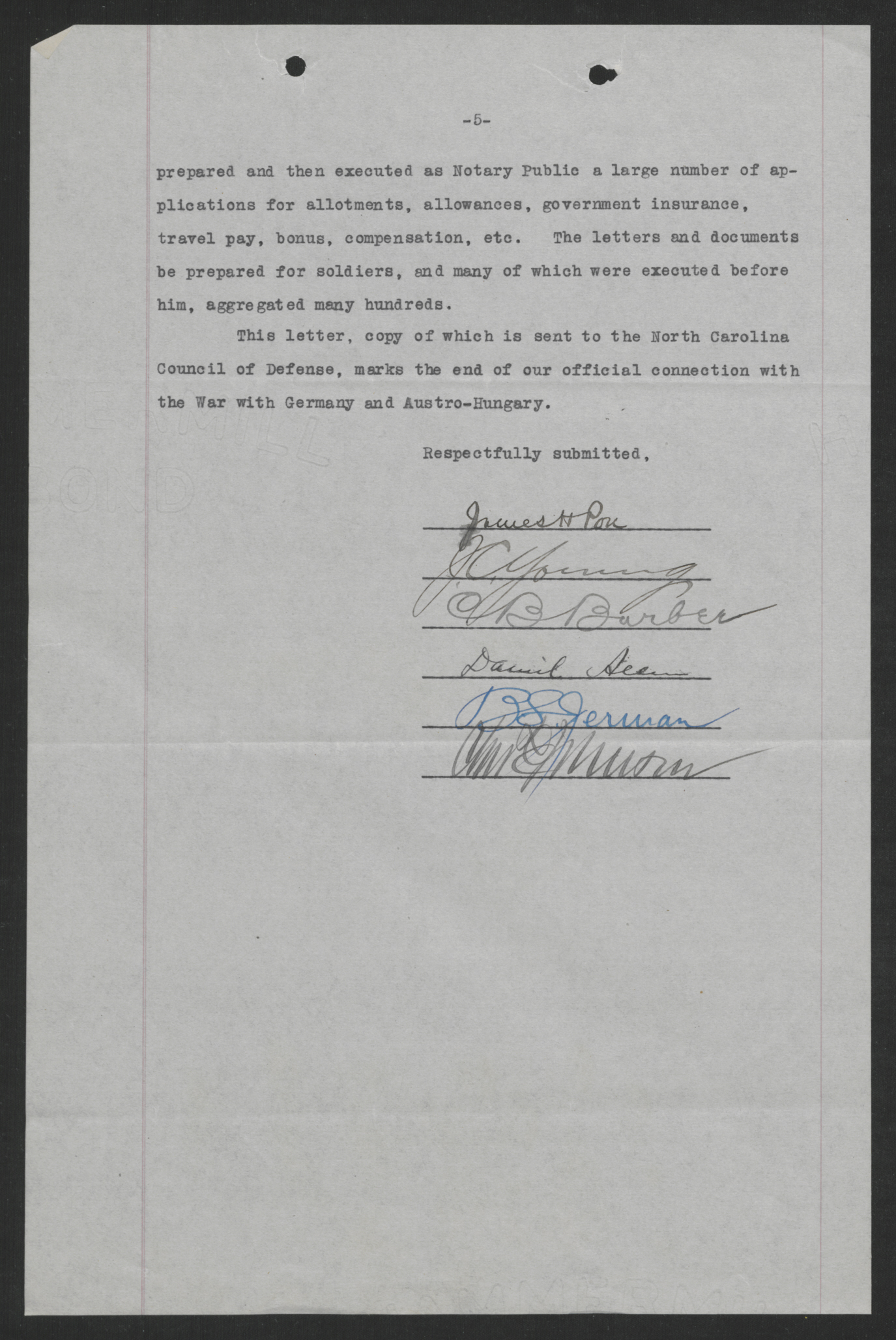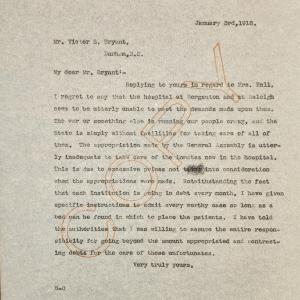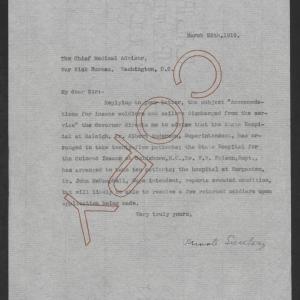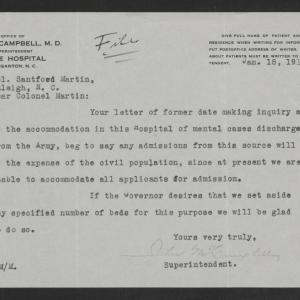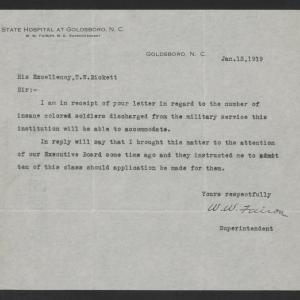Raleigh, N.C., May 20th, 1920.
Hon. Thomas W. Bickett, Governor,
Raleigh, N.C.
Dear Sir:
We, the members of Soldiers' Business Aid Committee for Wake County, having performed all the services which it seems practical for us to perform on behalf of the soldiers and sailors from this County, beg leave to make this our Final Report.
By virtue of commissions issued by you to us, we did on July 26, 1917, perfect our organization. Mr. James H. Pou was made Chairman, Mr. B. S. Jerman, Treasurer, and Mr. J. C. Young, Secretary. Directions for the work we were expected to perform were received from the North Carolina Council of Defense; and we gave notice in the newspapers that we were ready to perform all the duties imposed upon us by your appointment and by the directions received from the State Council of Defense.
When appointed we expected to be called upon to perform numerous services, and we prepared to render the same. We stated that we would need some money, and suggested that $1,000 be raised for the Committee. More than that sum was promptly placed at our disposal, and we have never lacked for money. A number of prominent and patriotic citizens volunteered to furnish any reasonable sum which we might find we needed. If we have failed in our duty, it is not for lack of funds, for there has not been a day since we were organized that we did not have more money than we needed.
Soon after we were organized it became apparent that the United States Government would do many of the things which it was contemplated we should look after. The United States Government not only provided for soldiers' insurance, but a little later provided means by which premiums on insurance already held by soldiers be met while the policyholder was in the service. Many insurance companies waived privileges in order that they might render to soldiers assistance in carrying policies. We found that there was nothing for us to do in the matter of insurance, but to call attention to the soldiers of the providions made for them by the Government and to the liberality of insurance companies to their policyholders.
In protecting soldiers' property we likewise found little to do, because the laws passed by Congress made it impossible to foreclose mortgages, liens or taxes on the property of the soldier while he was absent; nor could a soldier be sued on a debt. Early in the war Congress made arrangements whereby allotments and allowances were made for the soldiers' families.
Instead, therefore, of undertaking any of these matters which the Government assumed, your Committee believed the best service it could render was to explain to the soldiers and their families how they could avail themselves of governmental assistance. We therefore prepared two booklets, one on insurance, allotments, allowances, etc., and the other on the protection of soldiers' property rights, digesting and explaining the laws on those subjects and making suggestions and giving directions how persons entitled to the benefits might avail themselves thereof, and giving explicit directions how to write for the same. Both these booklets were made State Documents, and circulated in every county. We saw to it that the Wake County Exemption Board was kept supplied with these pamphlets as well as with documents later prepared by the Government, so that ever soldier and his family might have the information.
When government insurance went into effect, at your suggestion, one member of this Committee went with you and the late Hon. W. S. Wilson, Secretary of the State Council of Defense, to the great camps near Columbia and Greenville, South Carolina, and there explained to the North Carolina soldiers the benefits of government insurance. The result was very gratifying.
Later as classes were sent by the Wake County Exemption Board to the camps, some member of your Committee appeared and explained a number of practical matters to the soldiers and their families, and gave them information relative to the protection of property and the method of securing allotments, allowances, government insurance, etc. Your Committee prepared forms of legal papers, especially wills, and furnished them to a number of the officers who went from Wake County.
Soon after our organization the Red Cross established a Home Service Department, whose duties were to look after the families of soldiers. We had a conference with this Department and agreed upon the division of duties. Your Committee was to look after the affairs of soldiers and to attend to requests that came to them concerning matters of business or property; and the Home Service Department of the Red Cross undertook the duty of looking after the soldiers' families. We can bear witness to the fact that the Home Service Department of the Red Cross did in Wake County splendid work and showed great patience and sympathy.
When we made this agreement we realized that we had more money on hand than we would need, and we transferred to Mrs. William B. Grimes, Chairman of the Red Cross for the use of the Home Service Department, the sum of $500.00 to be used by them during the blizzard in January, 1918. Later when the soldiers returned, finding that we still had more money than we needed, we again transferred to Mrs. Grimes, for use at the Red Cross Canteen in serving returning soldiers, the sum of $400.00; and still later when we felt assured that there would be no more calls upon us for money, we paid over the balance in hand, $319.25, to Major William Joyner, Chairman, for use at the Emergency Hospital in the second Influenza epidemic. Your Committee has expended every sent it had in hand. The payment to Major Joyner exhausted its bank account.
A number of loans were made to soldiers to tide over emergencies until Government allotments and allowances should become available to their families. Only two of these loans now remain unpaid. A complete record of all receipts and expenditures is in the hands of Mr. B. S. Jerman, but we have concluded it would serve no good purpose to give the names of the persons who were aided by this Committee.
Soon after its organization, a representtative from the Committee requested the Commissioners of Wake County and of the City of Raleigh to exempt all soldiers during their term of service from paying poll tax. Both Commissions promptly granted these exemptions.
So far as we know, the property of no soldier was sold in his absence for either taxes or debt; and in only a very few instances was any attempt made by a creditor or lien holder to enforce payment during the soldier's absence. The attitude of our people toward the soldier while in service was admirable, and left little for this Committee to do. We assisted in settling a few controversies between landlord and tenant, owner and contractor, and some financial controversies. Apparently the adjustments we assisted in bringing about were satisfactory to all parties. We sold some property at the request of soldiers obtaining satisfactory prices; and we secured some extension of leases. Several soldiers on their return asked our assistance in getting positions. In every instance they received the appointment to which we recommended them.
In brief, comparatively little was left for us to do except to aid the soldier in tiding over a temporary emergency and helping to make available the relief the Government had provided for him or his dependents. Our work became very largely the giving of information. We endeavored to keep ourselves informed of all Departmental rulings, and to pass that information quickly to all interested. This branch of the work did not require any money, but did require voluminous correspondence. The Committee was fortunate in having the assistance of Mr. J. L. Emanuel, who had served in the War Department. His familiarity with the routine was worth a great deal to us and to the soldiers. He placed his knowledge and time at our disposal without charge. Besides his service in the War Department, he is a licensed lawyer and a Notary Public, and his services in all these capacities were given freely to the soldiers during more than two years, and without one cent of charge. He prepared and then executed as Notary Public a large number of applications for allotments, allowances, government insurance, travel pay, bonus, compensation, etc. The letters and documents be prepared for soldiers, and many of which were executed before him, aggregated many hundreds.
This letter, copy of which is sent to the North Carolina Council of Defense, marks the end of our official connection with the War with Germany and Austro-Hungary.
Respectfully submitted,
James H. Pou
J. C. Young
C. B. Barbee
Daniel Allen
B. S. Jerman
[illegible]
Date:
Recipient:
Related People:
Repository:
Collection:
Places:
»» »» South Carolina

